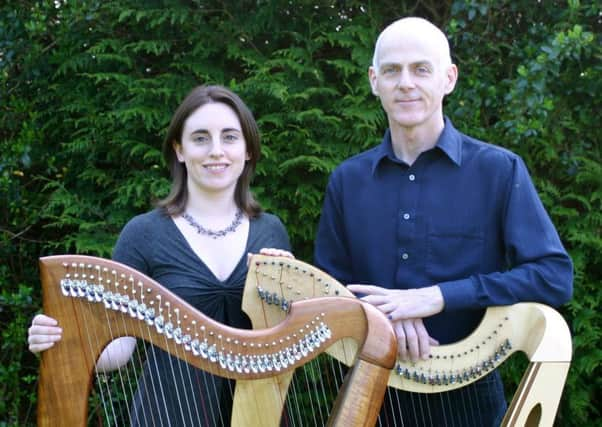Celtic harp pioneer Billy Jackson: “It was a leap of faith to jump from the electric bass to the harp”


“I was just very attracted by the appearance of it,” Jackson recalls, more than four decades on. Growing up in Glasgow with strong Donegal family connections and much time spent in the west of Ireland, he could hardly be unfamiliar with the national instrument: “Its image is everywhere in Ireland,” he adds. “Even when you get a tax demand there’s a harp on the envelope. It must be unique for a country to have a musical instrument in such prominence in everyday life.”
It would take on transformative prominence in Jackson’s own life. He switched electric bass for a Breton-made harp and, with fellow members of Contraband including his late brother, George, formed the group Ossian which became a celebrated folk presence at home and internationally, combining a delicate fretwork of strings with Scottish and Irish pipes.
Advertisement
Hide AdAdvertisement
Hide AdJackson also forged a notable path as a composer, pioneering the concept of the “folk orchestra” with his Wellpark Suite and other major compositions. He now lives in Ireland and next month he and his wife, the acclaimed Irish harpist Gráinne Hambly, appear at the 38th Edinburgh International Harp Festival.
While its image may not have achieved the same ubiquity as its Irish counterpart, the Scottish harp or clarsach is now commonplace in Scottish musical culture. When Jackson took it up, however, “anyone playing the Celtic harp then was doing it on their own, basically.
“Alan Stivell, the Chieftains and Clannad were playing harps, but they weren’t easy to access. It was a kind of leap of faith to jump from the electric bass to the harp, but I’d started on piano when I was 11, so it wasn’t that different from the piano in that it was right hand and left hand.”
Things have changed unimaginably since then. “For a start there are many more makers and the standard of instruments is really exceptional, as you’ll see from the makers’ exhibition at the harp festival.
“Also, when I started you could only get lessons from a [classical] pedal harp teacher, and they didn’t want you doing things you’d want to do in traditional music in terms of technique and ornamentation. A lot of people are teaching traditional music on the harp now and that’s really changed things.”
Teaching, of course, is a major aspect of the Edinburgh festival, with courses and workshops for all levels, while this year’s concert programme ranges characteristically across styles and nationalities to include the Corbalán Brothers from Paraguay, the Rodrigo Romaní Trio from Galicia in north-west Spain, and the Senegalese-Swiss-Israeli fusion trio JMO.
Scottish performers include the harp-fiddle duo Twelfth Day as well as such well-known names as Mary Ann Kennedy, Rachel Newton and the Poozies, while Isobel Mieras will conduct the festival’s harp orchestra in her St Kilda Suite.
Jackson and Hambly perform a mixture of 17th and 18th century harp repertoire along with contemporary material, complementing their harp sound with concertina, whistle and bouzouki. Back in County Mayo, Jackson, now 64, pursues a parallel career in music therapy, while Hambly teaches harp.
Advertisement
Hide AdAdvertisement
Hide AdIt’s now 34 years since his groundbreaking Wellpark Suite was premiered in Glasgow and his last large-scale commission was Duan Albanach for Celtic Connections in 2002. He hasn’t any further large-scale pieces in progress at the moment, he says, but lives in hope.
Three years ago, Ossian was inducted into the Scottish Traditional Music Hall of Fame. Today, Jackson
is gently self-deprecatory – “I’ve been waiting 30 years to be discovered overnight” – but his standing in Scotland’s harp fraternity is assured. - Jim Gilchrist
The Edinburgh International Harp Festival runs from 5-10 April at Merchiston Castle School, see www.harpfestival.co.uk